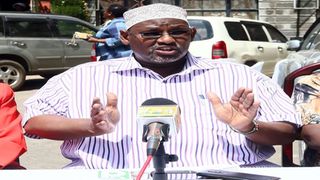
National Heroes Council Chairman Adan Wachu. He is the former Supkem secretary-general.
| File | Nation Media GroupPolitics
Premium
How State will select and honour Kenya’s mashujaa
What you need to know:
- The Kenya Heroes law is set to change how the country treats its heroes and will, for the first time, come up with a fund to cater for them.
- The new Heroes Council will now be required, as per the law, to identify and recommend national heroes.
- All persons recognised as heroes will be invited to national and community functions as State guests and cultural festivals.
They live on the edge, hardly noticed and often disregarded. They are heroes and heroines of yesteryear, men and women whose deeds have either been forgotten or nullified.
A month ago, the government quietly inaugurated a National Heroes Council, which will be chaired by former Supkem Secretary-General Adan Wachu, and whose members include Mau Mau war veteran Gitu Kahengeri, sportsman Eliud Kipchoge, award winning teacher Peter Tabichi and former registrar-general Bernice Gachegu.
While the Kenya Heroes Act had been assented to in April 2014, it had not been put into operation until last month. The Kenya Heroes law is set to change how the country treats its heroes and will, for the first time, come up with a fund to cater for them.
While the law provides for the establishment of a criteria for recognising, selecting and honouring heroes, it had all along been left to the whims of politicians and administrators without any clear guidelines.
National heroes
The new Heroes Council will now be required, as per the law, to identify and recommend national heroes. It will also have a register of national heroes and their dependants and will have capacity to “enforce sanctions and penalties in respect of disgraced national heroes.”
With the setting up of the Heroes Council, a National Heroes Fund, whose income shall be used “for the benefit of national heroes who are in need of financial assistance and their dependants”, will be established.
The dependants, a child, shall be given assistance until they attain the age of 18 and for a widow or widower, it shall cease upon remarriage. The Fund’s resources will be determined by the council “out of its own funds or from donations, endowments, and bequests from any source.”
To determine heroes, the council will, going forward, publish notices in both print and electronic media calling for nominations. After vetting, based on established criteria and objections from the public, the final names will be handed over to the President to declare a person a national hero.
“The names of all people declared as heroes shall be notified by the President by notice in the gazette,” the Act says.
“The investiture of heroes shall take place during Mashujaa Day, celebrated on the 20th October in each year, and the person so invested shall be awarded the certificate set out in fourth schedule,” says the law.
State guests
All persons recognised as heroes will be invited to national and community functions as State guests and cultural festivals. Concerts and festivals will be organised in their honour.
The council will also have mandate to publish books depicting the heroes’ role in the country’s history.
The heroes will have their names inscribed in parks, roads, streets or estates.
The heroes will also be accorded free transport to public functions to which they are invited within the country.
After death, the Council, if it considers it necessary, will build and maintain a symbolic tomb, monument or statues in honour of the hero.
There will also be established Heroes Squares in various parts of the country.
Any national hero can be reported for misconduct to the Council, which shall appoint a committee to investigate such allegations. If a national hero is found guilty, the council shall withdraw the privileges and remove the person from the heroes register.
Such misconduct shall include violation of Chapter Six of the Constitution or conviction by a court of law.
National heroes will be determined in several functional areas that include liberation struggle, spiritual leadership, indigenous knowledge, cultural values and practice, arts, sports, scholarship and professionalism, peacemaking and statesmanship.
Other areas of heroism will include national cohesion, environmental conservation, human rights, entrepreneurship and industry.





